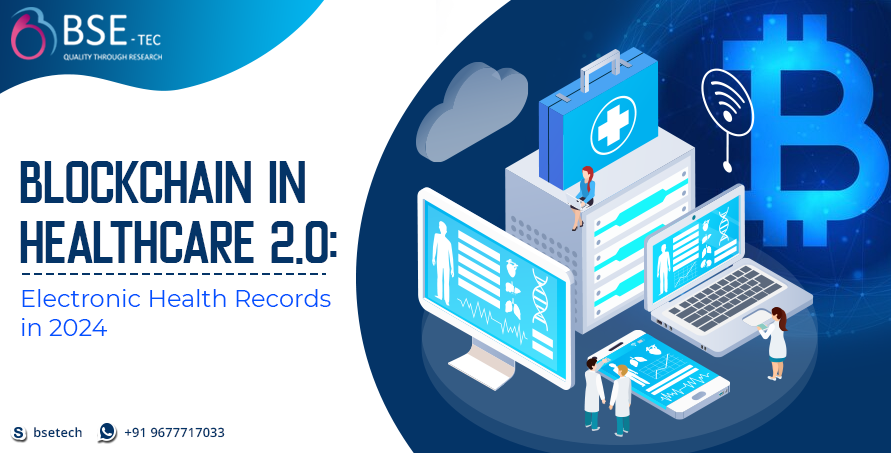Blockchain in Healthcare 2.0: Electronic Health Records in 2024

In 2024, the use of blockchain technology in healthcare may continue to evolve more specifically in managing electronic health records (EHRs). How will Blockchain be involved? So curious to know about it. let’s move on. We know Blockchain is a decentralized and secure digital ledger that transforms the way EHRs are stored, accessed, and shared among patients and healthcare organizations.
What are EHRs?
An electronic health record is the systematized collection of patient and population electronically-stored health information in a digital format, which can be accessed, and shared easily which reduces the missing files, loss of data, and so on.
Advancements in blockchain-based EHRs
- The most common pain points in the Medical industry are likely Data mismatch
- Huge files/records of an infinite number of patient visits
- Loss of record
- Hardcopy forgotten by patients
- More paper works
- Manual documentation/filing
There are many more challenges the medical industry faces, But implementing blockchain in healthcare provides a UID to each patient who enrolls and stores their data in blockchain. When required Data can be accessed, Blockchain provides the seamless exchange of patient data across different healthcare providers and systems, so any healthcare organization can securely access and update patient records in real-time in the EHR platform they are using.
The most significant development is the integration of patient-controlled EHRs on the blockchain where patients can have more control over their health data/records, allowing them to grant and revoke access to their records as they see fit. This empowers patients to actively participate in their care, strengthens trust between patients and healthcare providers, and keeps them aware of their medical reports. Nearly 20- 45% of diagnostic errors occur in the medical sector which affects the peacefulness of patients. Further, blockchain technology has played a vital role in enhancing data security and privacy in EHRs.
Its immutable nature of blockchain ensures that once data is recorded, it cannot be altered or tampered even if it happens it’s quite easy to trace thereby safeguarding the integrity of Also, advanced encryption techniques and decentralized storage have significantly reduced the risk of data breaches and unauthorized access to sensitive health information.
Claims: Smart contracts in blockchain-based EHRs automate and streamlines various administrative processes, such as insurance claims processing and medical billing. Smart contracts enable automatic verification and execution of agreements, reducing administrative burden and minimizing errors in the billing and reimbursement process regardless of the third-party loan/insurance service providers.
The use of blockchain in electronic health records can help in lowering the costs associated with maintaining and sharing EHRs. By eliminating intermediaries and streamlining processes, blockchain has the potential to reduce administrative expenses and improve cost-effectiveness in healthcare.
→ Storage of patients data /records in blockchain
→ Pharma medical billing updates via supply chain
→ Claims of medical billing/ insurance auto claims
→ Accuracy in diagnosing storage
→ Patients history
Overall, the integration of blockchain in electronic health records offers a range of benefits, including improved security, interoperability, patient control, data integrity, streamlined processes, and potential cost savings, making it a promising technology for transforming healthcare. Are you a startup in the medical field? Need to digitize your patients’ health records? Get connected with BSEtec – a leading blockchain development company that can assist you in building secure and transparent web3 applications.
Did you find this article useful? Let us know by leaving a comment below, or join us on Twitter and Facebook.




